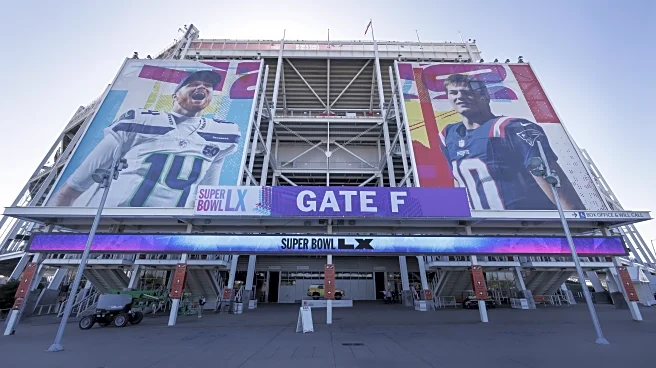What's Happening?
Eight Senate Democrats have reached an agreement with Republicans to end the ongoing government shutdown, according to recent reports. The deal involves a future vote on extending enhanced Affordable Care Act subsidies, which was a critical demand from
the Democrats. This agreement aims to conclude the longest government shutdown in U.S. history within days. The shutdown has affected various federal services, including air traffic control, and has been a point of contention between the two parties. The Democrats' decision to strike a deal without securing immediate health care protections has sparked discussions about the implications for Obamacare subsidies.
Why It's Important?
The resolution of the government shutdown is significant as it impacts federal operations and services across the country. The agreement between Democrats and Republicans highlights the ongoing negotiations and compromises necessary in U.S. politics. The future vote on extending Affordable Care Act subsidies is crucial for millions of Americans who rely on these health care protections. The shutdown's end will restore normalcy to affected federal services, including air traffic control, which is vital for national transportation and safety. The political dynamics of this agreement may influence future legislative negotiations and party strategies.
What's Next?
With the agreement in place, Congress is expected to vote on the extension of Affordable Care Act subsidies in the near future. This vote will be closely watched by stakeholders, including health care providers and recipients, as it will determine the continuation of enhanced health care protections. Political leaders from both parties may react to the deal, potentially influencing upcoming legislative sessions and negotiations. The resolution of the shutdown may also lead to discussions on preventing future shutdowns and improving bipartisan cooperation in Congress.
Beyond the Headlines
The decision by eight Democrats to compromise on immediate health care protections in exchange for ending the shutdown raises questions about party unity and strategic priorities. This development may have long-term implications for Democratic strategies in upcoming elections and legislative sessions. The focus on Affordable Care Act subsidies underscores the ongoing debate over health care reform in the U.S., highlighting the challenges in balancing political negotiations with public policy goals.

















